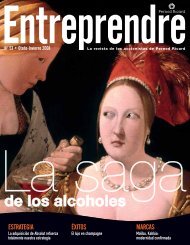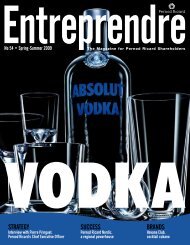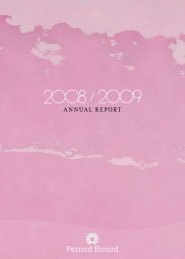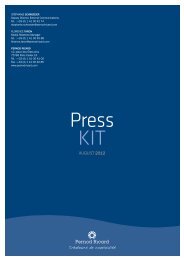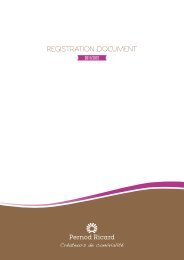Registration Document - Pernod Ricard
Registration Document - Pernod Ricard
Registration Document - Pernod Ricard
Create successful ePaper yourself
Turn your PDF publications into a flip-book with our unique Google optimized e-Paper software.
Entitlement to dividends –<br />
Entitlement to share<br />
in the issuer’s earnings<br />
Net earnings are comprised of the Company’s income as derived from<br />
the income statement after deduction of overheads and any other<br />
social contributions, depreciation of assets, and all provisions for<br />
commercial or industrial contingencies, if any.<br />
From the net earnings, reduced when necessary by prior losses, at<br />
least 5% is withheld for transfer to the legal reserve. The deduction is<br />
no longer mandatory when the legal reserve reaches an amount equal<br />
to one tenth of the share capital. It once again becomes mandatory in<br />
the event where, for any reason whatsoever, this reserve falls below<br />
one tenth.<br />
From the distributable earnings, as determined by law, the amount<br />
required to pay an initial dividend of 6% of the fully paid-up,<br />
unredeemed value of the shares is deducted, subject to the possibility<br />
that the Board of Directors authorise shareholders who request to do<br />
so to pay up their shares in advance, where the payments made cannot<br />
give rise to entitlement to the aforementioned initial dividend.<br />
This initial dividend is not cumulative, i.e. if earnings for the financial<br />
year are not sufficient to make this payment or are only sufficient<br />
to make the payment in part, the shareholders cannot claim this on<br />
earnings for the following financial year.<br />
From the available surplus, the Ordinary Shareholders’ Meeting may<br />
decide to deduct all amounts it considers appropriate, either to be<br />
carried forward to the following financial year or to be transferred<br />
to extraordinary or special reserves, with or without special<br />
allocations.<br />
The balance is distributed among shareholders as an additional<br />
dividend.<br />
The Ordinary Shareholders’ Meeting is authorised to deduct from<br />
non-statutory reserves set up in prior years any amounts that it<br />
considers should be:<br />
◆ either distributed to the shareholders or allocated to total or partial<br />
depreciation of the shares;<br />
◆ capitalised or used for the repurchase and cancellation of shares.<br />
Wholly depreciated shares are replaced by dividend right certificates<br />
granting the same rights as the existing shares, with the exception of<br />
entitlement to the initial statutory dividend and capital repayment.<br />
Dividend payment terms and conditions are fixed by the Ordinary<br />
Shareholder’s Meeting or by default by the Board of Directors within<br />
the maximum period set by law.<br />
In deliberating on the financial statements for the financial year,<br />
the Ordinary Shareholders’ Meeting has the option to grant each<br />
shareholder the choice between a cash or stock dividend, for all or<br />
part of a dividend or interim dividend payment.<br />
Dividends must be paid within a maximum of nine months following<br />
year end. This period may be extended by court ruling. Dividends will<br />
be transferred to the French State within the legal period, i.e. five<br />
years.<br />
ABOUT THE COMPANY AND ITS SHARE CAPITAL 7<br />
Information about <strong>Pernod</strong> <strong>Ricard</strong><br />
Changes in the share<br />
capital and the rights<br />
attached to shares<br />
Any changes in the share capital or the voting rights attached to the<br />
shares making up the share capital shall be governed by the standard<br />
legal provisions as the bylaws do not contain any specific provisions<br />
in this respect.<br />
Shareholders’ Meetings<br />
The shareholders meet every year at an Ordinary Shareholders’<br />
Meeting.<br />
Notice to attend Meetings<br />
Both Ordinary and Extraordinary Shareholders’ Meetings are called,<br />
held and vote in accordance with the conditions provided for by law.<br />
They are held at the Company’s head office or in any other place stated<br />
in the notice of the Meeting.<br />
Decisions by the shareholders are taken at Ordinary, Extraordinary<br />
or Combined (Ordinary and Extraordinary) Shareholders’ Meetings<br />
depending on the nature of the resolutions they are being asked to<br />
adopt.<br />
Participation in Shareholders’ Meetings<br />
All shareholders have the right to attend the Company’s Shareholders’<br />
Meetings and to participate in the deliberations, either personally<br />
or through a proxy, regardless of the number of shares they hold. In<br />
order for a shareholder to have the right to participate in Ordinary or<br />
Extraordinary Shareholders’ Meetings, the shares must be entered<br />
in the name of the shareholder or in the name of the financial<br />
intermediary acting on the shareholder’s behalf at zero hours<br />
(Paris time) three business days prior to the Shareholders’ Meeting<br />
either in the registered share accounts kept by the Company, or in the<br />
bearer share accounts kept by the authorised financial intermediary.<br />
The entry or recording of the shares in bearer share accounts kept<br />
by the authorised financial intermediary shall be acknowledged via<br />
a certificate of participation issued by the financial intermediary<br />
attached as an appendix to a postal voting form or proxy form or<br />
to the application for an admission card made out in the name of<br />
the shareholder or on behalf of the shareholder represented by the<br />
registered financial intermediary. A shareholder wishing to attend<br />
the Shareholders’ Meeting in person who has not received his<br />
admission card by zero hours (Paris time) three business days before<br />
the Shareholders’ Meeting may also ask for such a certificate to be<br />
drawn up.<br />
If a shareholder does not attend the Shareholders’ Meeting in person,<br />
he may choose one of three possible options:<br />
◆ grant a proxy in writing to another shareholder or to his/her<br />
spouse;<br />
◆ cast a postal vote;<br />
◆ send a proxy form to the Company without giving details of the<br />
proxy, under the conditions provided for by the laws and regulations<br />
in force.<br />
Where a shareholder has already cast a postal vote, sent in a proxy<br />
form or applied for an admission card or a certificate of participation,<br />
he/she may not thereafter choose another method of participating in<br />
the Shareholders’ Meeting.<br />
I REFERENCE DOCUMENT 2008/2009 I PERNOD RICARD 181




